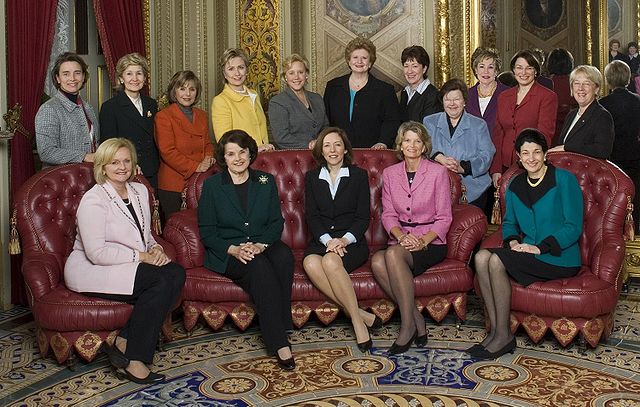The right kind of performance feedback narrows the gender gap in political engagement
Research shows that statistically women involve themselves less in politics than do men. But why is this the case, and what can we do about it? Here, Jessica Robinson Preece argues that the kind of feedback that women receive from their attempts to engage in politics is important in determining whether they will continue to participate.

Female US Senators [via Wikimedia Commons]
Women consistently report less interest in politics than men and dislike discussing politics more than men. This finding holds even after controlling for a host of factors like education and income. Scholars have proposed that this lack of interest in politics is partially to blame for women’s underrepresentation in a variety of political behaviours.
But why do women tend to avoid politics? One reason may be rooted in the common tendency to enjoy and invest time in activities that you feel confident you can succeed in. If women don’t feel like they are very competent in the domain of politics, they are less likely to enjoy and invest time in it. There is significant research that shows that women tend to be less confident than equally qualified men when it comes to politics. Years of socialisation that politics is a “man’s game” may be to blame. There is also compelling evidence that when women do participate in political deliberation, they have a more negative experience: they are more likely to be rudely interrupted and are less likely to be listened to than men. All of this may work together to make participating in politics more discouraging for women than for men.
So, I set out to find whether the kinds of feedback that men and women get when they participate in politics—and therefore their sense of whether it is an activity in which they can succeed—may be to blame for the gender gap in interest in politics.
I gave a short test of political knowledge to 646 male and female participants in an online survey in the United States. At the completion of this test, participants were randomly assigned to receive one of three kinds of feedback. The first group, the control group, was simply thanked for their responses and then directed to the remainder of the survey. They were then asked about their level of interest in politics. As existing research would predict, women expressed significantly less interest in politics than men among this group: their average response was 1.93 on a 5 point scale, whereas the men’s response was 2.25 on that same 5 point scale. Thus, the gender gap in political interest appears to be alive and well in this sample of participants.
After taking the quiz, a different subset of the participants was told “Great job! You did very well on this difficult quiz. Very few people do well on it.” They got this positive feedback regardless of their score. I hypothesized that this kind of encouraging feedback might boost women’s confidence in their ability to successfully participate in politics, and therefore make them more likely to express interest in politics. Indeed, that is exactly what happened. Compared to the control group, women in the positive feedback condition reported that they were significantly more interested in politics, bringing them up to a score of 2.32 on the 5 point scale.
What happened to the men in this condition? Essentially nothing. Their reported levels of political interest were more or less the same as the men in the control group. When combined with women’s increased interest in politics, the gender gap in political interest disappeared among these participants who got positive feedback. This dramatic decrease in the size of the gender gap is clearly visible in the figure below.
There was also a third condition in the study: accurate comparison feedback. What happens when you simply tell people how well they did compared to the average? It turns out that this condition closes the gender gap in political interest as well, though in a different way than positive feedback.
After taking the quiz, participants in this condition were told “You got [their score] out of 16 multiple choice questions correct. On average, people get 9 out of 16 correct.” This feedback had no effect on women’s levels of political interest. But it did have a significant impact on men’s levels of political interest. Instead of reporting an average of 2.25 out 5 on the political interest scale like the men in the control group, these men reported an average of 1.90 out of 5. Most of the decrease came from men who scored quite low on the quiz who were suddenly less interested in politics after learning about their below-average performance. These findings lend support to the idea that some men have an artificially high sense of their political competence.
The size of the gender gap in political interest for each condition
What conclusions can be drawn from this study? The first is that people’s perceptions of how politically competent they are influence how interested they are in politics. Psychologists have identified feelings of competence, or “internal self-efficacy,” as a significant predictor of behaviour for many years, but this is the first time it has been experimentally linked to political engagement. Helping people feel confident about their ability to participate in politics is key to increasing democratic engagement.
Second, given existing research, it’s not surprising that women’s baseline feelings of political competence are lower than men’s. Left to their own devices, women often assume the worst about their abilities while men often assume the best. But what is surprising is that these perceptions are highly malleable. Positive feedback shifts women toward politics in a way that closes the gender gap, while accurate feedback shifts men away from politics in a way that also closes the gender gap.
In short, some may prefer to close the gender gap in political interest by praising all those who make an effort to engage in politics—and, my research shows that it’s not even necessary to single out women with these congratulations, as they have little effect on men. Others may prefer to close the gap by giving individuals an accurate assessment of how their skills compare to others. Regardless, there is hope that current state of affairs, in which women are significantly less politically engaged than men, can be changed.
—
Note: this post represents the views of the author and not those of Democratic Audit or the LSE. Please read our comments policy before posting.
—
 Jessica Robinson Preece is an Assistant Professor in Political Science at Brigham Young University. Her research focuses on using experiments to learn how to close the gender gap in political participation and representation.
Jessica Robinson Preece is an Assistant Professor in Political Science at Brigham Young University. Her research focuses on using experiments to learn how to close the gender gap in political participation and representation.





 Democratic Audit's core funding is provided by the Joseph Rowntree Charitable Trust. Additional funding is provided by the London School of Economics.
Democratic Audit's core funding is provided by the Joseph Rowntree Charitable Trust. Additional funding is provided by the London School of Economics.
Interesintg: positive feedback affects the #gender #gap in political engagement finds @jrpjrpjrp: https://t.co/kUgTjxB0Yt @democraticaudit
The right kind of performance feedback narrows the gender gap in political engagement https://t.co/CqTN1WgSMb
[…] This article first appeared at the Democratic Audit of the UK blog. […]
The right kind of performance feedback narrows the gender gap in political engagement https://t.co/5iJiz8tsTP
Does my political interest look big in this?Role of feedback in closing #gendergap in politics via @democraticaudit https://t.co/PIuUiziWOQ
The right kind of performance feedback narrows the gender gap in political engagement https://t.co/9ReJCiYJMu
https://t.co/xfdPWFrgUH The right kind of performance feedback narrows the #gendergap in political engagement #politics #equality
Jessica Preece @BYU:the right kind of feedback narrows #gendergap in political engagement https://t.co/HofMPITMJw @democraticaudit #demopart
The right kind of performance feedback narrows the gender gap in political engagement https://t.co/YLKJtCzqfN
The right kind of performance feedback narrows the gender gap in political engagement https://t.co/X7doYaKq6a https://t.co/e8PF4ZphzM